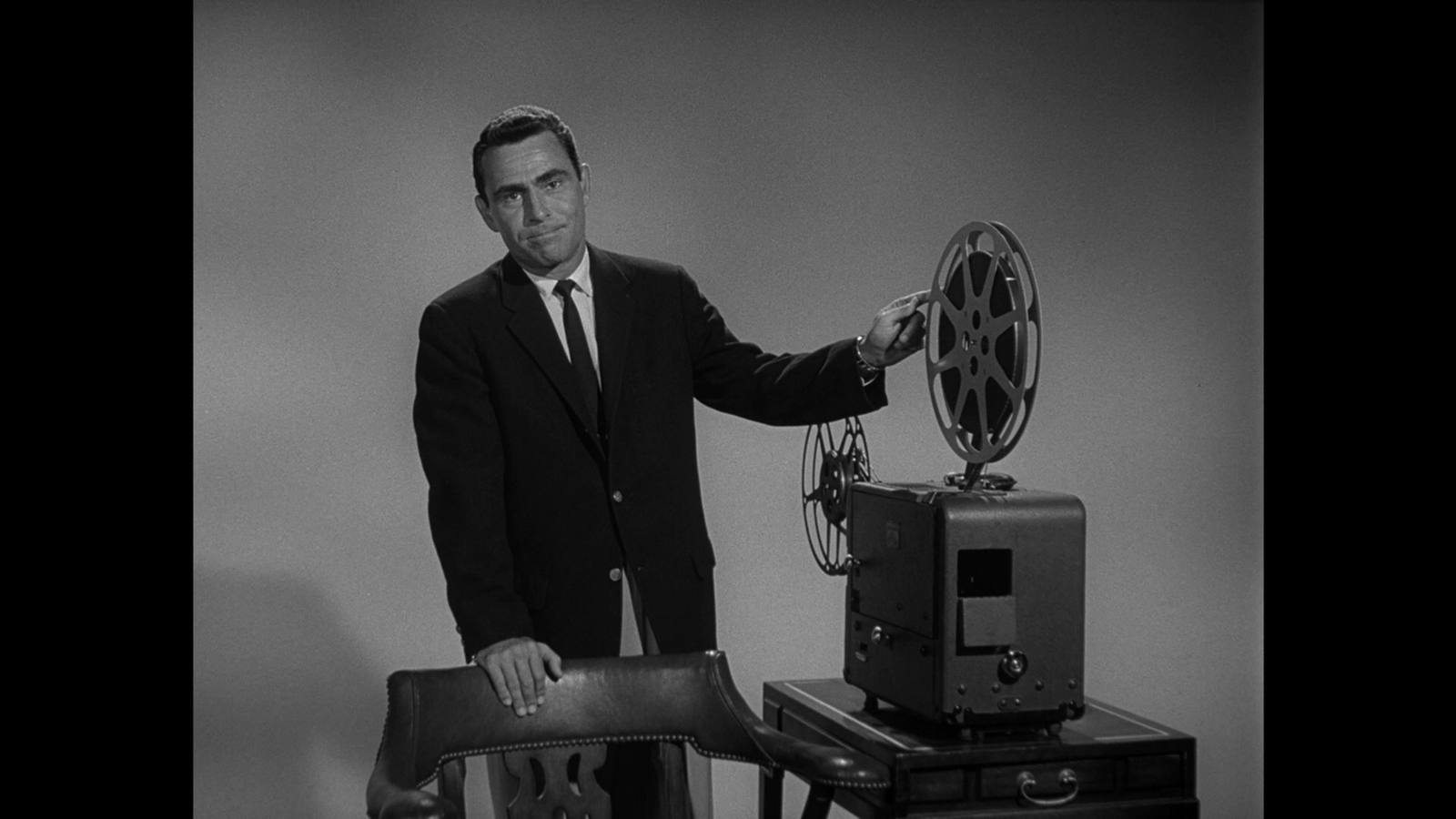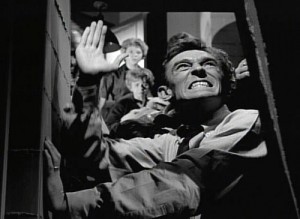Episode 68 – “The Shelter”
[quote source=”” rating=”0″]What you are about to watch is a nightmare. It is not meant to be prophetic, it need not happen, it’s the fervent and urgent prayer of all men of good will that it never shall happen. But in this place, in this moment, it does happen. This is the Twilight Zone.[/quote]
Most episodes of the Twilight Zone are characterized by their familiar structure of introducing us to a very ordinary scene, a Rod Serling introduction informing us we are taking a trip into The Twilight Zone, and then the rug of normalcy being pulled from under us. “The Shelter”, the first “excellent” episode of Season 3, coming none too soon as critics were beginning to turn on the show for exhausting it’s bold creativity with a string of uninspired stories with recognized twists. Unlike these earlier episodes, and unlike any episode before or after, “The Shelter” is an episode with “great immediacy” as Serling put it, an episode where we are constantly waiting for that rug to be pulled, but it never is.
After a brief introduction where we are introduced to a close community of decent upper-class Americans having a dinner party, the celebration gets cut short by a surprise announcement from the President, warning everyone of incoming Soviet missiles. Classic whip-pan to Rod Serling where his usual poetics are put on hold for a more solemn disclaimer that this is only “a nightmare” with no grounding in reality. Of course, like most episodes of the show, this was a farce to simply appease the incredibly strict television censors who wanted nothing but fanciful escapism to permeate into households across the nation. Seeing as Serling used The Twilight Zone to critique social and political values in the 1960’s, the show has always heavily involved itself with the atomic bomb, often exploiting its nearly supernatural power. Almost every episode of the show, certainly nearly every episode written by Serling himself, contain traces of the nuclear scare whether it be the paranoia before the bomb or the implications after it. “The Shelter”, the third episode from what would later be called the show’s hallmark third season, is one of the very few that deal with the bomb head-on, as it’s coming down. It’s a riveting episode that demands the respect Serling delivers up front and is still a wonder how it ever made it to television. The Twilight Zone on a whole is a trailblazer for the television industry of today, but “The Shelter” is certainly a groundbreaker in it’s own right, defining the limits of what people will watch and the startling response to the episode would define boundary-pushing television for years to come.
Nightmare is right, it is impossible for anyone from my generation to even begin to comprehend the fear that rippled through the collective unconscious of the United States. Watching this episode must have been like exploring a dangerous reality that was more future than fiction. At the same time, this is much of why The Twilight Zone has remained a television classic. As difficult as it may have been to watch, it was important to watch. The episode handles the savagery and hostility of panicked people nearly as well as “The Monsters Are Due On Maple Street” and handles imminent devastation as well as the best episodes of the series. It is more harsh and brutal than these other episodes, having no supernatural or alien device to remind the audience it’s all just an act. The episode is as serious as the threat of nuclear war and is certainly a more vital survival tool than hiding under your desk. The Twilight Zone has been known for it’s inconsistent acting, but everyone here pulls surprisingly wrenching performances likely because it wasn’t so much an act as it was a release of their actual anxiety. Remember, this was a time before the Cuban Missile Crisis, the threat of this kind of attack was at it’s peak. There is no information that I can find about the viewership numbers, but Serling assured it’s popularity stating, “we had 1,300 letters and cards inside of two days”, which surely in no small part helped keep the show afloat for another full season, seeing as CBS was eager to cancel the show, and did by season’s end (only to bring it back again).
Serling Stamp of Morality. Selfishness and savagery are the elements at play here, which might sound redundant as nearly every episode of the show deals with these in some regard. But as I said, “The Shelter” takes these themes head-on. Like many of the best episodes, there is no good or bad, just shades of grey. Bill, the only neighbour on the block who bothered to build a shelter in the case of attack turns on his neighbours that he was drinking wine with only moments ago, literally leaving them and their newborn children to burn in the nuclear fallout because his shelter “is only designed for three”. His abandonment is cruel, but necessary to save his family, in his own eyes. There is nothing sinister about Bill’s decision, but he holds a firm and rather vicious belief that the neighbours brought it upon themselves for not taking the threat of nuclear war seriously, and for that, they shall die. A strange move for Serling, who would usually deflate the eccentric social fears and beliefs and expose them for the farces they often were. Here he seems to be punishing people for not taking this very real threat seriously, their barbecues and wine tasting were more important than a shelter until they only had 15 minutes to assemble one. However, this again could be the disconnect between my own world and the world of the 1960’s, with knowledge of the era, it is ludicrous to take the hysteria so seriously today, but at that time, there was no foreknowledge.
On the other hand, the more violent selfishness comes from the entire neighbourhood that piles into Bill’s basement, each pleading at his (surprisingly flimsy) steel door to save their family mixing guilt with curses to no avail. Inside the shelter, suddenly Serling’s direction that you should run out and buy a shelter ASAP is flipped on its head. By having the only shelter, Bill and his family must listen to the pathetic mass of former friends pleading for sympathy as they die, extending this situation from nightmare to something else entirely.
As more and more friends and families appear at the door, their attitudes turn from confusion to violence. Typically, the first idea thought up and agreed upon is to smash the door down which sends the group into a flurry of mouth-foaming savagery. There is the token single-voice-of-reason who is swiftly ignored but is highlighted even stronger to the audience because of that. The spontaneity of this mob mentality leads to needless clashes within the group who all want to achieve the same goal; suddenly the true colours of these people emerge as one father remorselessly reveals his racist inclinations towards another former friend, disregarding his opinions because he is “half-American”. Another person starts a brief debate about the rights and worth of people from adjacent streets to share this shelter. The primal instincts that expose themselves, much like “The Monsters Are Due On Maple Street” show Serling at his most honest, how he truly believes typically moral citizens would behave under such extreme and immediate stress. The success of both these episodes suggests, hey, maybe he’s on to something here.
This episode is a Conservative favourite, being spotlighted by talking-heads like Glenn Beck because of the strong theme of individual responsibility and family-first mentality. At the same time, the episode can be interpreted as a cautionary tale of individualism, the price that would cost you, as well as the need to remain civilized and compassionate amongst others in stressful times.
Spell it all out at the end. As the group breaks in the door, a conveniently timed announcement comes in on the radio stating the alert was a false alarm. Like a light switch, the entire group flips back to compassion mode where they hug one another and apologize for their behaviour. They turn to Bill who slowly emerges from his destroyed shelter, destroyed not by a bomb but by people, and just like if a bomb hit it, it ultimately did no good once emerged from. Bill closes the episode with a monologue about how the people destroyed each other and there is no normal anymore. Sure, nuclear devastation was avoided, but the episode certainly doesn’t end on a high note. Everyone puts on their disguises again, but it’s for nothing, as we all now know who they truly are — and more importantly, what the bomb can turn us into, without leaving the ground.

